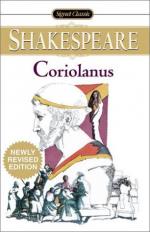|
This section contains 8,578 words (approx. 22 pages at 400 words per page) |

|
Many critics have examined the destructive potential of Coriolanus's uncompromising belief in personal honor. Charles Mitchell has equated Coriolanus's obsession with honor with his quest for political power. As Coriolanus is a man of action, his ethical perspective derives principally from his belief in the aristocratic virtue of honor even if this belief is detrimental to society as a whole. Mitchell contends that "for Coriolanus public power signifies personal honor" and the Roman "cannot concede the possibility of power's being divided between master (the aristocrat) and servant (the plebeian)." Eugene M. Waith has enumerated Coriolanus's godlike qualities and argued that the hero's acts of courage correspond to those of the classical Greek demi-god Hercules and that Shakespeare's work, therefore, is a "heroic drama" rather than a tragedy." D. J. Gordon has analyzed Shakespeare's critique of honor in Coriolanus, seeing the playas a demonstration of the destructive results...
|
This section contains 8,578 words (approx. 22 pages at 400 words per page) |

|




